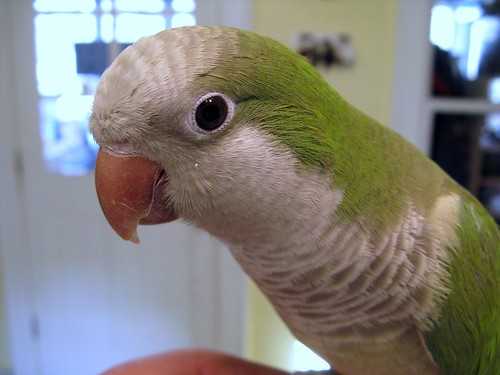 Captive raised parrots, like Gizmo, are unlikly to establish in the wild. Image by Jim LynchFor the love of a pet bird named Gizmo, a Youngwood woman is suing the state, claiming Game Commission officials appeared on her doorstep and seized the 26-year-old Monk parakeet, leaving her with an empty cage and a broken heart.
Captive raised parrots, like Gizmo, are unlikly to establish in the wild. Image by Jim LynchFor the love of a pet bird named Gizmo, a Youngwood woman is suing the state, claiming Game Commission officials appeared on her doorstep and seized the 26-year-old Monk parakeet, leaving her with an empty cage and a broken heart.
But commission officials say Faith Good's pet is on the state's prohibited list.
The chatty, green, gray and blue birds with orange beaks, also known as Quaker parakeets, have been dubbed agricultural pests, a threat to native wildlife and a general nuisance because of the expansive nests — sometimes 10 feet across — they build on utility lines and transformers, often causing outages.
“Unlike many nonnative bird species, the Monk parakeet is tolerant of colder temperatures and can establish wild populations in places like Pennsylvania,” commission spokesman Travis Lau said.
“These birds often nest in colonies and build giant nests, and when they become prolific in the wild, they compete with and can displace native wildlife, particularly native birds,” he added.
Acting on a tip from the public, commission officials picked up Gizmo is March. Since that time, the bird has been held in an undisclosed location, Lau said.
But Good says Gizmo is nothing more than a beloved family pet she purchased for her daughter 26 years ago, six months before the state banned the birds.
“I haven't even touched his cage since the day he left,” said Good, 63. “I don't have the heart to take that newspaper out of the cage.”
Good got choked up on Monday thinking about Gizmo's large vocabulary and how he would mimic her voice.
“It's hard. I think of him every day,” she said.
In her lawsuit filed in Westmoreland County on Sept. 5, she asks state officials to return the bird she paid $600 for in January 1987 when Gizmo was a month old.
At the time, she thought the bird was a different type of parakeet, she said. She kept quiet when she learned the truth 20 years later.
“I didn't want somebody to take him and euthanize him,” Good said.
Good's attorney, Anthony Rosner, disputed the notion Gizmo could wreak havoc on the local ecosystem.
“It's only one bird, so it can't mate,” he said.
Experts disagree, and that's why Pennsylvania and a handful of other states have banned the parakeets.
While one Monk parakeet probably won't cause damage on its own, should the bird escape and find a mate, they could devastate
local agriculture, said Scott Detwiler of the Audubon Society of Western Pennsylvania.
“It doesn't necessarily take a whole lot,” he said. “The threat is real.”
Monk parakeets can ruin crops, such as corn and fruits, if allowed to breed, said Bob Mulvihill of the National Aviary in Pittsburgh.
Monk parakeets, generally about a foot in length, are native to South America. They were brought to the United States in the late 1960s and early 1970s.
Petition: Give Faith Good's Monk Parakeet, Gizmo, back to her.